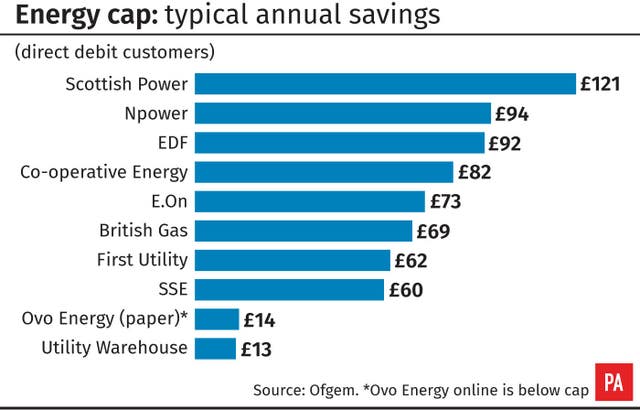Energy price cap will save 11m households £1bn a year, says watchdog
Ofgem has proposed to set the cap for the typical dual fuel customer paying by direct debit at £1,136 a year.

More than 11 million households will save a combined £1 billion a year under plans to cap rip-off gas and electricity tariffs at £1,136, the energy watchdog has announced.
Ofgem said each typical customer would save around £75 a year on average, with those on the most expensive default standard variable tariffs saving more than £120 a year when the cap comes into effect.
It has proposed to set the cap for the typical dual fuel customer paying by direct debit at £1,136 a year, forcing suppliers to cut prices to that level or below.

Dermot Nolan, chief executive of Ofgem, said: “Once the price cap is in place, all households in Great Britain covered by the cap will be protected from being overcharged for their energy.
“Consumers can have confidence that falls in energy costs will be passed on to them and if costs increase, Ofgem will ensure that any rise will be due to genuine increases in energy costs rather than supplier profiteering.”
Ofgem said it will update on the level of the cap in April and October every year to reflect wholesale energy prices and costs of supplying, which it said would ensure households on standard variable tariffs “will always pay a fair price for their energy”.
Greg Clark, the Business and Energy Secretary, said: “We have always been clear and determined that the injustice found by the CMA that loyal customers were being exploited must end.
“This Government is delivering on its promise to end that injustice and protect households across the country from unjustified price rises.”
He added the details of the cap outlined by Ofgem give households confidence that “when energy costs fall their bills will too”.
Ofgem has already capped bills through its safeguard tariff for 4 million pre-payment meter households, which was extended in February to 1 million more vulnerable consumers on poor-value default deals who already received the Government’s Warm Home Discount.
Stephen Murray, energy expert at MoneySuperMarket, said households would be better off switching to save money than relying on the cap to give them a fair deal.
He said: “Don’t get lulled into a false sense of security by the political soundbites – the easiest way to bring down your bills is to go online and switch now to a competitive fixed-rate tariff.”
Industry group Energy UK said the cap will pose a “significant challenge” to many suppliers.
Chief executive Lawrence Slade said: “There are over 70 suppliers in the energy market who will now be assessing how this impacts their individual business.
“It is crucial that the cap ensures we have an investible energy sector where efficient and financially robust companies can trade, and innovation and engagement can continue to flourish and deliver benefits for consumers.”
Justin Bowden, national officer of the GMB union – which represents energy workers, said: “The only way to protect consumers from being ripped off in a monopoly situation is if the Government itself takes on the functions of energy regulation including the role of energy price control – making it accountable to Parliament, subject to scrutiny and with powers to limit profits and, where necessary, to finance and run power stations.
“That would be the foundation of an energy policy that took the real decisions needed to protect consumers, keep the lights on and ensure the decarbonisation of the sector, whilst guaranteeing the resources needed to generate jobs and to pay for the vital infrastructure crucial to maintain our power networks.”





